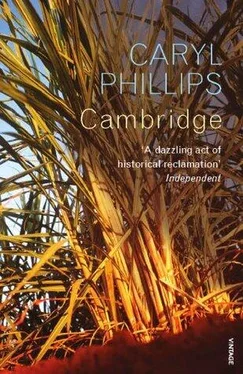Caryl Phillips - Cambridge
Здесь есть возможность читать онлайн «Caryl Phillips - Cambridge» весь текст электронной книги совершенно бесплатно (целиком полную версию без сокращений). В некоторых случаях можно слушать аудио, скачать через торрент в формате fb2 и присутствует краткое содержание. Год выпуска: 2009, Издательство: Vintage Digital, Жанр: Современная проза, на английском языке. Описание произведения, (предисловие) а так же отзывы посетителей доступны на портале библиотеки ЛибКат.
- Название:Cambridge
- Автор:
- Издательство:Vintage Digital
- Жанр:
- Год:2009
- ISBN:нет данных
- Рейтинг книги:5 / 5. Голосов: 1
-
Избранное:Добавить в избранное
- Отзывы:
-
Ваша оценка:
- 100
- 1
- 2
- 3
- 4
- 5
Cambridge: краткое содержание, описание и аннотация
Предлагаем к чтению аннотацию, описание, краткое содержание или предисловие (зависит от того, что написал сам автор книги «Cambridge»). Если вы не нашли необходимую информацию о книге — напишите в комментариях, мы постараемся отыскать её.
Cambridge — читать онлайн бесплатно полную книгу (весь текст) целиком
Ниже представлен текст книги, разбитый по страницам. Система сохранения места последней прочитанной страницы, позволяет с удобством читать онлайн бесплатно книгу «Cambridge», без необходимости каждый раз заново искать на чём Вы остановились. Поставьте закладку, и сможете в любой момент перейти на страницу, на которой закончили чтение.
Интервал:
Закладка:
What a day! I write now on land, but my heart is giddy. I have great difficulty in maintaining my balance, veering first to the left, and then to the right, much as I did when aboard ship. It must be a curious sight to behold, but I am told that such visions are quite common, and before two days have expired my person will once more steer a true course. My last night on board the little wooden world passed most pleasantly. Having consumed what amounted to a near feast, soft slumber then contrived to seal my eyes for many an hour. If only all my nights in this cabin had passed as pleasantly it would be politic to consider making such voyages for recreation. Indeed, one might venture to suggest that such voyages could benefit the health of a traveller, instead of threatening their very existence.
In the morning I stepped out on deck as the sun cleared the horizon. We were at anchor. The view of the island that I now beheld was nothing less than magnificent. We had drifted perhaps only a further two hundred yards towards shore, but this gave one the opportunity of discerning not only general movement, but individual negro figures going about their daily business. I bade the captain farewell, and rewarded him with a small bag of coins for having delivered me safely. The truth is I wish I had a coin for every member of his crew, for my survival was more a tribute to their skills than to any act of this bellicose man, who could barely mutter a few words of thanks upon my presenting him with this token of my appreciation. I enquired as to the existence of any known family for the cabin-boy. As far as the captain was concerned there was none. And so his family lineage would appear to have reached a watery conclusion. I then raised the difficult question of wishing to know where, as near as it was possible for him to advise me, we finally committed Isabella to her grave. The captain, without even pausing for thought, answered, 'By the Azores.' He responded with such speed that for an instant I wondered if this was his common answer to all such enquiries, but I deemed it sage to hold my tongue and thank him for his information. I requested such knowledge having decided that upon my return to my native land I would erect a monument for Isabella, inscribing it with all the details of her life, and sadly her death too.
Now I was ready to leave. The negro pilot reappeared and drew a small boat up against the side of our ship. Having taken modesty into account, and having spurned all tendered help, I descended an unlikely ladder constructed of rope, and set myself in this diminutive vessel. The crew on deck applauded my feat, but I wondered if their applause signified relief at having finally abandoned this woman. They might now roister anew without consideration (if any they did show) for the presence of a lady, for these men were clearly used to treating female creatures as little more than beings of an inferior nature whose task it was merely to render service and expect in return neither gratitude nor the simplest cheering word or kindly smile. I looked back and folded my fingers in farewell, as the negro began to paddle gracefully in the direction of Baytown. He kept time and tune to his oars with what appeared to be an extemporaneous chant. As far as I was able to discern, the song was composed of the following words:
Old rum kill de captain
O dear, He must die
New rum kill de sailor
O dear, He must die
Hard work kill de neger
O dear. He must die
La, la, la, la, etc.
A few yards short of the shore I discovered that there was yet another journey to be made, for it proved inadvisable to beach the small craft in such shallow waters. I therefore completed my adventure on the back of a negro. I arrived exceedingly wet and much incommoded by the surge. On shore I discovered a white gentleman whose hair was cut uncommonly close to his head. I wondered if this butchery illustrated the local fashion, but I chose to remain silent. My suitor claimed to have spent many hours waiting for my arrival, and he presented a letter of his credentials which he assured me entitled him to the honour of attending me to my father's plantation. Again I said nothing, for I now simply desired to take some rest and change out of my wet clothes. Before we left the shore the gentleman beckoned to a shoeless negro girl, whose head was buried in an old felt hat that had clearly lost its original shape. She bestowed upon me a glass of what I was informed the locals call sangaree, a tropical drink composed of Madeira, water, sugar and lime juice. This most refreshing drink served to increase momentarily the giddiness that I felt on achieving terra firma, but I was assured that its medicinal value far outweighed any unpleasant reaction that I might temporarily experience.
With the aid of my gentleman companion, I stepped aboard a carriage belonging to the estate. The carriage was light and airy and drawn by English horses. This seemed to me a needless expense, for I knew that in these parts they were blessed with perfectly serviceable horses from New England. I noted the difference between this carriage and those preferred by the negroes, whose carriages were large and heavy and drawn by mules. I further noted that the negro men wore thin-clothed apparel which left scarce anything to the imagination, and that their women wandered hither and thither barely stirring to cover their bodies. Certainly most had nothing about them more substantial than a petticoat. I imagined that in such heat as this clothing would indeed become burdensome, so I did envy the negroes their ability to dress without concern for conventional morality. However, on first encountering such a manner of display it is difficult to disguise one's revulsion.
On noticing my discomfort the gentleman at my attendance chose to enter the black throng and return with a negro woman, who was clearly a pilgrim of some sixty years. Her toothless gums were visible through her thick and open lips, and her church hat failed to mask her sad, unfeminine baldness. My factotum placed her on the backplate of our carriage and furnished her with a large fan, with which it was understood that her task would be to cool me during the forthcoming journey. And so with a black driver now in place, the gentleman seated on the rear seat next to myself, and the negro woman already gently fanning our persons, we set forth towards the estate, which I knew to be not above three or four miles to the north-west of Baytown. As we did so I bestowed a final gaze upon the good sailer which had conveyed me safely to these American shores. I am not above admitting that if one had looked closely at my visage it might have been possible to have espied a tear of sadness. This first part of my journey was over and I was breaking the last remaining link with a past that I understood. From this moment I would be entering a dark tropical unknown.
The noble English horses edged forward with an unconcerned surety of step which led me to speculate that they could have confidently negotiated an independent route to our destination. As we moved away the legion of negro people gawped and suspended whatever activity they had been engaged in. They exhibited a savage curiosity. I believe it was I who was the object of wonderment upon which their eyes were riveted, but soon we were lost from view. I struck up conversation with the gentleman, who informed me that in this place the spring does not give way to the summer, nor the summer to autumn. It is a fact that these three seasons are bound together as one, and that what we commonly know as winter makes no appearance of any kind. The heat, he pointed out, witnessing my continued distress, is something that one acclimatizes to as long as one is sensible enough to take certain elementary precautions. First of all, one must never take exercise after nine in the morning. Second, one must never expose oneself to the dew after sundown. And third, one must never take rest in a lodging house, unless of course that lodging house is managed by a trustworthy person with whom one is familiar. The gentleman insisted that his final caution was most important because of the lack of common cleanliness that one often finds among the negroes. They might be entrusted to prepare food and wash linen and so on, but only when properly trained. I made a mental note of all that he said and we progressed in silence.
Читать дальшеИнтервал:
Закладка:
Похожие книги на «Cambridge»
Представляем Вашему вниманию похожие книги на «Cambridge» списком для выбора. Мы отобрали схожую по названию и смыслу литературу в надежде предоставить читателям больше вариантов отыскать новые, интересные, ещё непрочитанные произведения.
Обсуждение, отзывы о книге «Cambridge» и просто собственные мнения читателей. Оставьте ваши комментарии, напишите, что Вы думаете о произведении, его смысле или главных героях. Укажите что конкретно понравилось, а что нет, и почему Вы так считаете.












